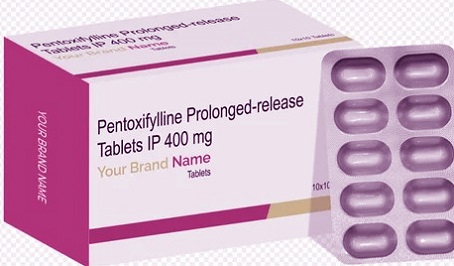Pentoxifylline's Potential Role in Reducing COVID-19 Hospitalizations and Its Implications for Long COVID Management
Nikhil Prasad Fact checked by:Thailand Medical News Team Oct 26, 2024 1 year, 3 months, 1 week, 3 days, 23 hours, 9 minutes ago
Medical News: The search for effective COVID-19 treatments has led scientists to revisit an existing medication, pentoxifylline, traditionally used to improve blood flow in various medical conditions. Pentoxifylline, known for its ability to impact blood vessels and reduce inflammation, is now being examined for its potential in treating COVID-19. Researchers from institutions including Mansoura University-Egypt, Damascus University-Syria, Cairo University-Egppt, and Misr University for Science and Technology-Egypt have studied its impact on COVID-19 patients, particularly in reducing hospitalization duration and inflammation markers. This
Medical News report details the study findings, aiming to explore pentoxifylline as a viable addition to COVID-19 treatment protocols.
 Pentoxifylline's Potential Role in Reducing COVID-19 Hospitalizations and Its
Pentoxifylline's Potential Role in Reducing COVID-19 Hospitalizations and Its
Implications for Long COVID Management
Study Overview: What Pentoxifylline Brings to COVID-19 Treatment
The study examined clinical trials, retrospective cohort studies, and other investigations to understand pentoxifylline’s effectiveness. The research focused on assessing the length of hospital stays, mortality rates, inflammation markers, ICU admission rates, and potential adverse events. Researchers compared patients receiving pentoxifylline in addition to standard COVID-19 therapy with those receiving standard therapy alone, observing promising outcomes, especially in reducing hospitalization duration.
Key Findings: A Closer Look at Pentoxifylline's Effects
-Hospitalization Duration: In most studies, patients treated with pentoxifylline alongside standard therapy spent less time in the hospital than those receiving only standard care. The meta-analysis of five studies with 443 participants found an average reduction in hospital stays by about two days. This significant decrease was a primary outcome across multiple studies, underscoring pentoxifylline’s potential to hasten recovery.
-Inflammation Markers: The drug's effect on inflammation markers, like C-reactive protein (CRP) and interleukin-6 (IL-6), showed varied but positive results. CRP levels, which often rise due to COVID-19’s inflammatory response, were significantly lower in pentoxifylline-treated patients in several studies. Similarly, IL-6 levels, another indicator of inflammation, showed improvement in certain trials, suggesting pentoxifylline’s role in managing COVID-19's inflammatory effects.
-Mortality Rates: Mortality reduction was one of the primary outcomes, yet findings were mixed. Some studies, like Seirafianpour's 2023 trial, reported a notable drop in mortality among patients receiving pentoxifylline, whereas others observed no statistically significant differences. This may be attributed to factors like differing patient profiles, varying comorbidities, and inconsistent standard therapy practices.
t;-ICU Admission and Length of Stay: For critically ill patients, especially those needing ICU support, pentoxifylline demonstrated potential benefits. In one study, the ICU admission rate and length of stay were reduced in patients treated with the drug. Another study reported that none of the patients treated with pentoxifylline needed ICU admission over a 28-day period, marking a promising trend in preventing severe disease progression.
-Safety and Tolerability: Across the studies, pentoxifylline was generally well-tolerated with few adverse reactions reported. This aspect is crucial as COVID-19 treatments must balance efficacy with safety, especially for patients with comorbid conditions. The findings suggest that pentoxifylline does not introduce significant additional risks, making it a potentially viable option for a broader patient demographic.
Long COVID Implications: Can Pentoxifylline Help in Recovery?
Long COVID, characterized by lingering symptoms post-infection, affects a significant percentage of COVID-19 survivors. Symptoms like fatigue, brain fog, depression, and cardiovascular issues are common, with some persisting for months or even years. Pentoxifylline’s effect on inflammation and blood flow may hold promise for managing these long-term symptoms. Research has shown that prolonged hospitalization can increase the risk of long COVID, so a drug that reduces hospital stay duration could indirectly lower this risk. Additionally, pentoxifylline has been tested in other clinical settings for managing neuropsychiatric and cognitive symptoms, which are also prevalent in long COVID.
Limitations of the Study
Despite its promise, pentoxifylline research faces challenges. One key limitation was the inconsistency in standard COVID-19 therapy across studies, introducing variability in the data. Additionally, differences in study designs and patient profiles further complicated the analysis. The limited duration of follow-ups in some studies also meant that long-term outcomes, particularly for mortality, were inconclusive.
Conclusion
The systematic review and meta-analysis provide encouraging evidence that pentoxifylline may reduce hospitalization duration and improve inflammatory markers in COVID-19 patients. This effect could translate into a faster recovery, helping reduce the healthcare burden and potentially lowering the risk of long COVID for survivors. The mixed results in mortality rates suggest that while pentoxifylline has clear benefits, its impact on life expectancy in COVID-19 patients remains uncertain. However, its safety profile and efficacy in reducing inflammation make it a promising candidate for further exploration, particularly in managing long COVID symptoms.
The study findings were published in the peer-reviewed journal: Inflammation Research.
https://link.springer.com/article/10.1007/s00011-024-01942-0
For the latest COVID-19 News, keep on logging to Thailand Medical News.
Read Also:
https://www.thailandmedical.news/news/new-recombinant-sars-cov-2-variant-xek-likely-to-be-the-next-predominant-strain-by-late-winter-superseding-xec
https://www.thailandmedical.news/news/diaphragm-muscle-atrophy-linked-to-long-term-fatigue-in-covid-19-survivors
